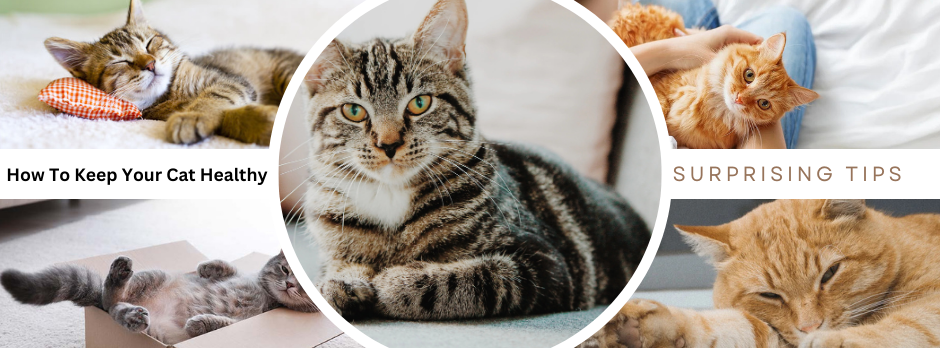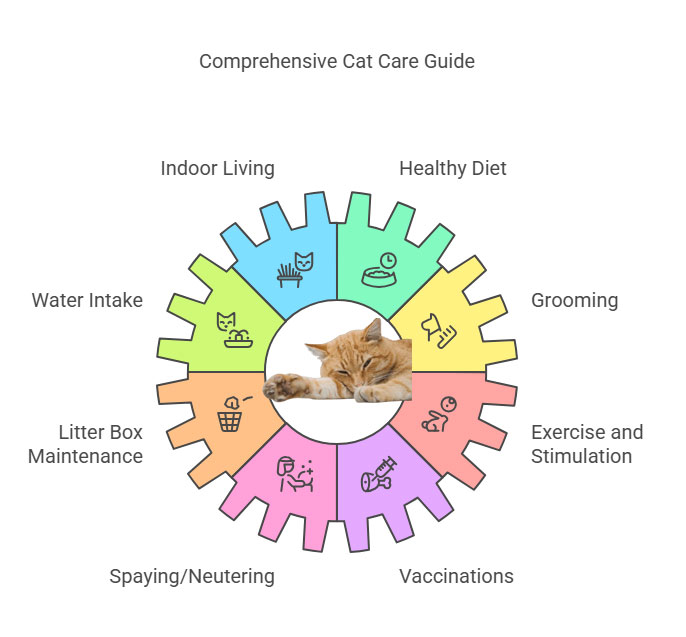Your cat needs good care to live a long and healthy life. Cats are wonderful companions that bring joy to many homes. To ensure they live a long and happy life, focusing on their health is essential. Follow these tips to keep your cat in top shape.
Understand That a Healthy Cat Is a Happy Cat
Cats need care to thrive. Many cat owners believe that because cats are domesticated animals, they do not need the same level of care as wild animals. While cats are less fragile than some other types of animals, they still need our help to remain healthy.
It is important to understand your cat’s needs and cater to them appropriately. A healthy lifestyle impacts their mood, energy, and behavior. Recognize signs of well-being, like shiny fur and active play. If your cat seems off, it might be a sign of illness. Pay attention.
“Cats are connoisseurs of comfort.” – James Herriot
Keep Your Cat Indoors
Indoor cats live longer. They avoid dangers like traffic, predators, and harsh weather. Provide a safe indoor environment with toys and climbing trees. Cats love windows, so a perch near one keeps them entertained.
Feed a Healthy Diet
Nutrition is crucial for cats. Feed high-quality cat food with protein as the primary ingredient. Avoid giving human food. Some foods, like chocolate and onions, are toxic to cats. For portion sizes, follow the guidelines on the food label or consult your vet.
Monitor Water Intake and Output
Cats often don’t drink enough water. Dehydration leads to kidney problems. Use a cat water fountain to encourage drinking. Keep an eye on their litter box. Changes in urination might indicate health issues. Contact your vet if you notice anything unusual.
Manage Their Furballs by Employing Grooming Techniques
Regular brushing reduces shedding and furballs. Long-haired breeds require daily grooming. Short-haired cats benefit from weekly brushing. Grooming not only keeps their coat healthy but also builds a bond between you and your pet.
Keep the Litter Box Clean
A dirty litter box can stress your cat. Scoop daily and change the litter weekly. Clean the box with mild soap and water. Place it in a quiet, accessible spot. Cats prefer a private area for their litter box.
Provide Them With Exercise and Stimulation
Cats need physical and mental stimulation. Play with them daily using laser pointers or feather toys. Offer scratching posts and puzzle feeders. These activities prevent boredom and keep them fit.
Get Her Spayed or Neutered
Spaying or neutering prevents unwanted litters and reduces health risks. Spayed females avoid uterine infections. Neutered males are less likely to roam or fight. Talk to your vet about the right time for the procedure.
Ensure Vaccinations Are Kept Up to Date
Vaccinations protect cats from diseases like feline leukemia and rabies. Follow your vet’s vaccination schedule. Even indoor cats need vaccines to stay safe from potential risks.
Go to the Vet for Routine Check-Ups
Regular check-ups catch health issues early. Cats are good at hiding pain, so a vet’s expertise is vital. Schedule a visit once a year for a healthy adult cat. Senior cats or those with medical conditions may need more frequent visits.
Frequently Asked Questions
1. What food is best for cats? High-quality cat food with meat as the primary ingredient is best. Avoid fillers like corn or soy.
2. How often should I brush my cat’s fur? Brush long-haired cats daily and short-haired cats weekly. Grooming reduces shedding and furballs.
3. Is it okay to let my cat outside? Keeping your cat indoors is safer. Outdoor cats face dangers like traffic and predators.
4. How do I encourage my cat to drink more water? Use a cat water fountain. Cats enjoy fresh, moving water. Clean bowls regularly.
5. Why does my cat need vaccinations if they stay indoors? Vaccines protect against airborne or accidental exposures to diseases like rabies.


